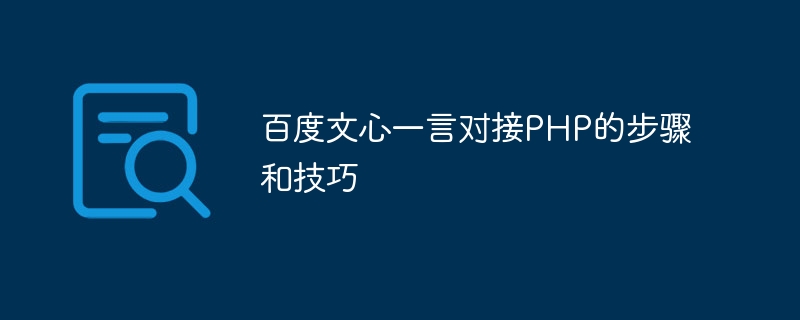Home >Backend Development >PHP Tutorial >Steps and techniques for docking Baidu Wenxin Yiyan with PHP
Steps and techniques for docking Baidu Wenxin Yiyan with PHP
- WBOYWBOYWBOYWBOYWBOYWBOYWBOYWBOYWBOYWBOYWBOYWBOYWBOriginal
- 2023-08-25 17:34:452074browse

Steps and techniques for connecting Baidu Wenxinyiyan to PHP
With the popularity of social media, webmasters often want to add some interesting content to their websites features to attract more users. Baidu Wenxin Yiyan is a very popular feature that allows your website to display a chicken soup-style famous saying every day. This article will introduce how to use PHP to connect to Baidu Wenxinyiyan, and attach code examples.
Step 1: Apply for Baidu Wenxin Yiyan interface
First, you need to go to the official website of Baidu Wenxin Yiyan to apply for the interface. After the application is successful, you will get an API key, which will be your credentials for communicating with Baidu Wenxinyiyan.
Step 2: Set up a PHP environment
On your website server, make sure that the PHP environment has been set up. You can use XAMPP, WAMP or other PHP integrated environments, which I won’t go into details here. Make sure your PHP version is no lower than 5.3, because subsequent code examples will use some new features of PHP.
Step 3: Write PHP code
Create a new PHP file in your website project, which can be named quotes.php. In this file, we will use PHP's curl library to send a request to Baidu Wenxin Yiyan and obtain the returned quote information. The following is a simple code example using the curl library:
<?php
$api_url = "http://api.budejie.com/api/api_open.php";//接口地址
$ch = curl_init();
curl_setopt($ch, CURLOPT_URL, $api_url);
curl_setopt($ch, CURLOPT_RETURNTRANSFER, true);
$response = curl_exec($ch);
if ($response === false) {
echo "请求失败:" . curl_error($ch);
} else {
$data = json_decode($response, true);
if (isset($data['result'])) {
$result = $data['result'];
echo $result['content'];
} else {
echo "获取名言失败";
}
}
curl_close($ch);In the above code, we use the curl_init() function to initialize a curl session, and use the curl_setopt() function to set some options, including requests The address and format of the returned data. Then, use the curl_exec() function to send the request and receive the returned data. Finally, we use the json_decode() function to decode the returned JSON data into an associative array and extract the content of the famous quote.
Step 4: Display the famous quote on the web page
After successfully obtaining the content of the famous quote, we can display it anywhere on the web page. Here, we take the example of displaying quotes at the top of a web page. Add the following code to your web page:
<!DOCTYPE html>
<html lang="en">
<head>
<meta charset="UTF-8">
<title>百度文心一言示例</title>
</head>
<body>
<div>
<h1>每日一言:</h1>
<p><?php include_once("quotes.php"); ?></p>
</div>
</body>
</html>In the above code, we use PHP's include_once() function to introduce the quotes.php file and display its content in a paragraph in the web page . This way, each time the browser visits your web page, a different quote will be dynamically loaded.
Summary:
This article introduces how to use PHP to connect Baidu Wenxinyiyan and dynamically display famous quotes on the web page. By applying for Baidu Wenxinyiyan's interface, using the curl library to send requests and parsing the returned data, the famous quotes are finally displayed on the web page. This way, you can make your website more interesting and attract more users.
I hope this article can help you successfully connect with Baidu Wenxinyiyan and implement this interesting function in your website. May your website become more and more popular!
The above is the detailed content of Steps and techniques for docking Baidu Wenxin Yiyan with PHP. For more information, please follow other related articles on the PHP Chinese website!
Related articles
See more- Sample code for PHP to interface with Java's AES/ECB/PKCS5Padding encryption method (picture)
- Solution to garbled code found after testing with php after connecting to Apache
- Interface docking guide between PHP and Alibaba Cloud Platform
- Implementation method of connecting Baidu Wenxin Yiyan API with PHP to obtain specific types of sentences and translate them
- How to implement data backup and recovery of Baidu Wenxin Yiyan API in PHP development?

